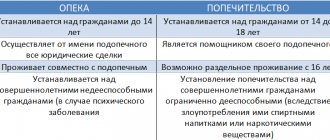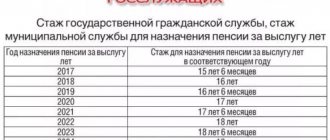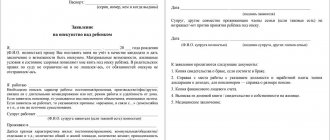§ 7. Guardianship, trusteeship and patronage
§ 7. Guardianship, trusteeship and patronage
1. The concept and goals of guardianship and trusteeship
Every citizen (individual), regardless of age and state of health, is capable of having rights and responsibilities, i.e. has legal capacity. But not all citizens (individuals) are able to independently exercise their rights and fulfill their duties due to lack of legal capacity or its complete absence. To compensate for the missing or absent legal capacity of such citizens and to protect their rights and interests, the institution of guardianship and trusteeship is used. Consequently, guardianship and trusteeship are one of the forms of state protection of the individual.
Before the adoption of the Civil Code of the Russian Federation in 1994, relations related to guardianship and trusteeship were regulated by family law. However, it was recognized that guardianship and trusteeship are closely related to the institutions of civil legislation on the legal capacity and capacity of citizens, and therefore should be considered by the science of civil law and, in any case, cannot be attributed only to family law <1>. The most widespread interpretation of guardianship and trusteeship was as a mixed institution of civil, family and, to some extent, administrative law (for example, in terms of control of local administration over the performance of guardians and trustees of their duties) <2>. The idea of the comprehensive nature of the legal regulation of guardianship and trusteeship relations is justified; it is also reflected in legislation.
——————————-<1> See: Sverdlov G.M. Soviet family law. M., 1958. P. 27; Webers Y.R. Correlation of civil and family legislation // Issues of civil and labor legislation of Soviet Latvia. Riga, 1965. P. 78.
<2> See: Soviet family law / Ed. V.A. Ryasentseva. M., 1982. P. 239 240.
Currently, the fundamental rules on guardianship and trusteeship are contained in the Civil Code of the Russian Federation (Article 31-40), which at the same time establishes that the activities of guardians and trustees related to the upbringing of minors under guardianship or trusteeship are subject to regulation by family law (Clause 1 of Article 150 of the Family Code of the Russian Federation). According to paragraph 4 of this article, the civil rights and obligations of a guardian (trustee) are determined by Art. Art. 36 38 Civil Code. Thus, in the civil law course, the subject of study is the civil legal aspects of guardianship and trusteeship.
Guardianship is established over children under the age of 14, as well as over citizens declared incompetent by the court due to a mental disorder (Clause 1, Article 32 of the Civil Code). The essence of guardianship is that instead of a child under 14 years of age, or instead of a person declared incompetent by a court due to a mental disorder, all rights and responsibilities are exercised by a specially appointed person. Guardians are representatives of wards by force of law and completely replace wards in property relations. Guardians make all necessary transactions on behalf of their wards and in their interests; they defend the rights and interests of their wards in relations with any persons, including in the courts, without special authority, on the basis of a certificate issued by the guardianship and trusteeship authority, or a decision of this body on the appointment of this person as a guardian.
In the literature, the opinion is sometimes expressed that guardianship is established over completely incompetent citizens <1>. This formulation is inaccurate, since the Civil Code does not consider children aged 6 to 14 years to be completely incompetent, but, on the contrary, determines the scope of their partial legal capacity.
——————————-
ConsultantPlus: note.
Commentary on the Civil Code of the Russian Federation, part one (edited by O.N. Sadikov) is included in the information bank according to the publication CONTRACT, INFRA-M, 2005 (third edition, corrected, supplemented and revised).
<1> See, for example: Commentary on the Civil Code of the Russian Federation, part one / Rep. ed. HE. Sadikov. M., 1995. P. 60.
Guardianship differs from guardianship in the content of the duties that the law imposes on guardians and trustees. It is established over citizens who are partially capable, over minors aged 14 to 18 years, as well as over citizens whose legal capacity is limited by the court due to the abuse of alcoholic beverages or narcotic drugs (clause 1 of article 33 of the Civil Code).
Guardianship consists of the fact that a specially appointed person, a trustee, helps a partially capable or limitedly capable person to exercise their rights and fulfill their duties with his advice and gives or does not give his consent to such persons to carry out transactions and other legal actions (except for transactions that are minor or limited). a person with legal capacity has the right to act independently). The trustee, thus, does not completely replace the person over whom guardianship has been established, but only helps him make reasonable decisions, making up for the missing life experience of a minor or restraining a citizen limited in legal capacity due to alcohol or drug abuse from improper actions. At the same time, the trustee protects them from abuse by third parties.
2. Guardianship and trusteeship authorities
Guardianship and trusteeship are the responsibility of local governments. The most important issues are decided directly by the head of the district, city, district administration in the city at the place of residence of the person subject to guardianship or trusteeship, or at the place of residence of the guardian (trustee). The head of the administration makes a decision to establish guardianship (trusteeship) on the basis of a corresponding court decision and issues a resolution appointing a specific citizen as a guardian (trustee). The performance of other functions in the field of guardianship and trusteeship is assigned to the relevant departments (administrations), which are structural divisions of the local government: in relation to minors, to the departments (administrations) of public education; in relation to persons recognized as incompetent due to a mental disorder, to departments (administrations) of health care or departments (administrations) of social protection of the population.
The guardianship and trusteeship body selects persons who can be appointed as guardians (trustees), supervises the activities of guardians and trustees,, if necessary, provides them with assistance and assistance, considers complaints about improper actions of guardians and trustees, takes appropriate measures if circumstances are detected that negatively influencing the ward, etc. Thus, through the guardianship and trusteeship bodies, the state takes care of citizens who do not have legal capacity or have partial, incomplete legal capacity.
3. Persons appointed as guardians and trustees
When appointing guardians and trustees, it is taken into account that they are given great trust to most fully ensure the interests and well-being of the wards, their upbringing, and care for their health. In order to most fully take into account the interests of wards, the law establishes a number of general requirements for guardians and trustees. First of all, their moral and other personal qualities should be taken into account. They must be capable of a certain self-restraint for the sake of the person being taken under guardianship or trusteeship, who is socially weakly protected.
Also important are the requirements relating to the legal status of the person who has agreed to assume the duties and concerns of a guardian or trustee. According to paragraph 2 of Art. 35 of the Civil Code, only adults and capable citizens can be appointed as guardians and trustees. Consequently, citizens who have acquired full legal capacity due to marriage before the age of 18 or through emancipation cannot be appointed guardians and trustees, since although they are recognized as fully capable, they are not considered adults until they reach 18 years of age. Likewise, an adult citizen cannot be a guardian or trustee if his legal capacity is limited by the court on the grounds provided for in Art. 30 GK. By direct instructions of the law, citizens deprived of parental rights cannot be appointed guardians and trustees (Clause 2 of Article 35 of the Civil Code). It seems that this applies not only to cases when a guardian (trustee) is appointed to a minor or minor, but also to cases when he is appointed to a person declared incompetent due to a mental disorder.
Increased demands are placed on guardians and trustees of children. The Family Code of the Russian Federation establishes that persons with chronic alcoholism or drug addiction shall not be appointed guardians and trustees; persons suspended from performing the duties of guardians (trustees); persons with limited parental rights; former adoptive parents, if the adoption was canceled due to their fault, as well as persons who, for health reasons (according to the list of diseases established by the Government of the Russian Federation) cannot fulfill the responsibilities of raising a child (clause 3 of article 146 and clause 1 of article 127 of the Family Code) Code of the Russian Federation).
When appointing a guardian and trustee, the relationship between him and the person in need of guardianship and trusteeship is taken into account, and, if possible, the wishes of the ward. As a rule, persons close to the ward, mainly relatives, are appointed as guardians and trustees. In their absence, a guardian (trustee) is appointed at the discretion of the guardianship and trusteeship authorities.
A citizen can be appointed as a guardian or trustee only with his consent, i.e. these relationships are based on the principle of voluntariness. The law does not provide for any exceptions to this principle. However, during the period when the Code of Laws on Marriage, Family and Guardianship of 1926 was in force in the RSFSR, it was also possible to forcefully assign a citizen the duties of a guardian or trustee (Article 78 of the Code). In the literature, it was persistently proposed to abandon this rule and establish that only those persons who express a desire to fulfill this honorable duty and public duty can be appointed as guardians and trustees <1>. This proposal was later enshrined in law in Art. 126 of the Code on Marriage and Family of the RSFSR of 1969. The principle of voluntary assumption of the duties of a guardian or trustee is currently contained in the Civil Code of the Russian Federation (clause 3 of Article 35). In practice, when appointing a citizen as a guardian or trustee, the written consent of his spouse and adult family members is required, since care for the ward is usually carried out by all family members if the responsibilities of the guardian or trustee are assumed by a family person.
——————————-<1> See: Ershova N.M. Guardianship and trusteeship of minors. M., 1959. P. 67; Parchment A.I. On the issue of the legal status of minors // Uch. zap. VIUN. Vol. 3. 1955. P. 36.
There are cases when it turns out to be impossible to select a guardian or trustee for a person in need of guardianship (trusteeship) within the one-month period established by law. In such a situation, the functions of a guardian (trustee) are temporarily performed by the guardianship and trusteeship authorities.
The law specifically regulates guardianship and trusteeship of persons who are or are placed in appropriate educational, medical institutions, social welfare institutions or other similar institutions. Such persons include minors, whose upbringing and maintenance are entirely carried out by the specified institutions, as well as citizens recognized as incompetent or partially capable and placed in appropriate institutions. Guardians and trustees are not appointed to such persons, since their functions are performed by the named institutions themselves, and they are recognized as guardians and trustees (clause 4 of article 35 of the Civil Code; clause 1 of article 147 of the Family Code of the Russian Federation).
4. Rights and obligations of guardians and trustees
The main duty must be considered to be the responsibility of guardians and trustees to take care of the maintenance of their wards, to provide them with care and treatment, and in relation to minor wards, also about their education and upbringing. This general responsibility is specified in relation to different areas of activity of guardians and trustees. The most important place among them is occupied by the sphere of property relations.
The guardian, being the legal representative of the ward, completely replaces him in property relations and, in accordance with this, has the right to make on behalf of the ward all transactions that are necessary to ensure the interests of the ward and the purposes of guardianship. The trustee has the right to give or not give consent to transactions by the ward. However, the rights of the guardian and trustee in this area are significantly limited in the interests of the wards. This is expressed in the fact that the guardian, without the prior permission of the guardianship and trusteeship authority, does not have the right to carry out, and the trustee does not have the right to consent to the following transactions:
on alienation, including exchange or donation, of the ward’s property, leasing it (lease), for gratuitous use or as collateral;
transactions entailing the renunciation of the rights belonging to the ward, the division of his property or the allocation of shares from it, as well as any other transactions entailing a decrease in the property of the ward (clause 2 of Article 37 of the Civil Code).
In order to prevent possible abuses, the guardian, trustee, their spouses and close relatives are prohibited from entering into transactions with the ward. An exception is made for the transfer of property to a ward as a gift or for free use.
Property relations in the field of guardianship and trusteeship become significantly more complicated if part of the ward’s property is transferred to trust management (Article 38 of the Civil Code). The need to use the civil law institution of trust management arises in the following circumstances: if the ward owns real estate and valuable movable property (for example, securities) and the need to ensure permanent management of it.
Trust management is established on the basis of an agreement concluded between the guardianship and trusteeship body and the manager, who is determined by this body. The property transferred to trust management is separated from the property of the ward. In this case, the guardian (trustee) retains his powers in relation to the property of the ward that has not been transferred to trust management. Property placed in trust must be used for the benefit of the ward. The manager's compliance with this obligation is controlled by the guardianship and trusteeship authority as a party to the trust management agreement. Trust management of the ward's property is terminated on the grounds provided for by law for termination of the agreement on trust management of property, as well as in cases of termination of guardianship and trusteeship, for example in connection with the achievement of a minor 18 years of age (see paragraph 2 of Article 38, Article 1024 of the Civil Code) .
Maintaining a ward inevitably requires certain material costs. As noted in the literature, in this case the following principle applies: “guardians and trustees are not obliged to support their wards” <1>. The sources of material support for wards are their pensions, scholarships, allowances, other social payments, alimony, wages, income from the management of their property (for example, dividends on shares, interest on deposits, etc.). The specified income can be spent by guardians and trustees exclusively in the interests of the ward and with the prior permission of the guardianship and trusteeship authority. However, if from the income of the ward the guardian (trustee) makes the necessary expenses for the maintenance of the ward for food, clothing, payment for services and other everyday needs, then obtaining permission from the guardianship and trusteeship authority is not required (clause 1 of Article 37 of the Civil Code).
——————————-
ConsultantPlus: note.
Commentary on the Civil Code of the Russian Federation, part one (edited by O.N. Sadikov) is included in the information bank according to the publication CONTRACT, INFRA-M, 2005 (third edition, corrected, supplemented and revised).
<1> Commentary on the Civil Code of the Russian Federation, part one / Rep. ed. HE. Sadikov. P. 66.
The duties of a guardian or trustee are considered honorable, based on a sense of civic and often family duty. In accordance with this, payment of any remuneration to guardians and trustees is not provided; they, as stated in paragraph 1 of Art. 36 of the Civil Code, perform their duties free of charge, except in cases provided for by law.
Some special responsibilities are provided for guardians and trustees of minors. In particular, they are required to live together with their wards. Separate residence of a guardian with a ward who has reached 16 years of age is permitted with the permission of the guardianship and trusteeship authority, provided that this does not adversely affect the education and protection of the rights and interests of the ward. Guardians and trustees of minors must take care of their education and upbringing, their health, physical, mental, spiritual and moral development (paragraph 2, paragraph 3, article 36 of the Civil Code, paragraph 1, article 150 of the Family Code of the Russian Federation).
5. Termination of guardianship and trusteeship
The length of time a citizen is under guardianship or trusteeship depends on the circumstances related to the personality of the ward and the personality of the guardian (trustee), as well as on some other circumstances specified in the law. The law allows for the release of a guardian or trustee from the performance of their duties and their removal from their performance.
Release occurs due to certain objective circumstances, in the absence of any claims from the guardianship and trusteeship authorities against the activities of the guardian or trustee. Liberation occurs:
if the minor is returned to his parents or someone has adopted him;
if the ward is placed for permanent stay in an appropriate educational, medical institution, social welfare institution or other similar institution.
In these cases, there are no grounds for continuing guardianship or trusteeship.
Exemption from the duties of a guardian or trustee is possible at their request. However, to satisfy such a request, it is necessary to prove that it is justified by valid reasons: illness, change in financial status, lack of mutual understanding with the ward, change of place of residence, etc. The decision on release is made by the guardianship and trusteeship authority.
Along with release, the law (Article 39 of the Civil Code) allows the removal of a guardian or trustee from the performance of his duties and his replacement by another person. Suspension is applied when a guardian or trustee fails to properly fulfill his duties, including when he uses guardianship or trusteeship for personal gain or when he leaves the ward without supervision and necessary assistance. At the same time, the guardianship and trusteeship authorities can take the necessary measures to bring the guilty citizen to liability established by law, including criminal liability. It is possible to remove a guardian or trustee from performing his duties even in the absence of his fault, for example, if shortcomings in his activities are due to a lack of experience, skills, pedagogical knowledge, etc. <1>.
——————————-
ConsultantPlus: note.
Commentary on the Civil Code of the Russian Federation, part one (edited by O.N. Sadikov) is included in the information bank according to the publication CONTRACT, INFRA-M, 2005 (third edition, corrected, supplemented and revised).
<1> See: Commentary on the Civil Code of the Russian Federation, part one / Rep. ed. HE. Sadikov. P. 69.
In addition to the release of the guardian or trustee from the performance of his duties or removal from their performance, guardianship or trusteeship is terminated on other grounds. Thus, guardianship over an adult citizen who was previously declared incompetent is terminated if the court makes a decision recognizing the ward as legally competent. Likewise, guardianship is terminated if, in relation to a citizen who was previously limited in legal capacity, this restriction is lifted by the court.
Guardianship also ends when the minor ward reaches 14 years of age. In this case, the citizen performing the duties of a guardian becomes the minor’s trustee without an additional decision on this. When a minor reaches 18 years of age, guardianship over him is terminated, and without a special decision, due to the very fact of reaching adulthood. If a minor acquired full legal capacity before reaching 18 years of age (clause 2 of Article 21 and Article 27 of the Civil Code), then guardianship over him is also terminated.
6. Patronage of capable citizens
The Civil Code of the Russian Federation (Article 41) enshrines a special form of ensuring the interests of adult and fully capable citizens who, for health reasons, cannot independently exercise and protect their rights and perform duties, patronage. This refers to patients who are unable to move and care for themselves, persons with severe injuries, the elderly, etc., in the absence of persons obligated to care for them. The guardianship and trusteeship body, with the consent of such a citizen, can appoint a trustee (assistant), who assumes the responsibility to provide regular assistance to the ward.
Since patronage relations are established with a fully capable person, all issues related to the exercise of his property rights are resolved only with his consent. Thus, the disposal of property belonging to such a citizen is carried out by a trustee (assistant) on the basis of an agency or trust agreement concluded with the ward. Household and other transactions aimed at maintaining and satisfying the household needs of the ward are carried out with his consent. The preservation of full independence for the ward of an adult capable citizen is also manifested in the fact that the patronage relationship can be terminated at any time at his request.
Patronage relationships are subject to many rules governing guardianship and trusteeship, in particular Art. Art. 34, 35, 39 Civil Code.
Principles and objectives of the institution of guardianship and guardianship
The main principles of the institution of guardianship and guardianship:
- establishment of guardianship (trusteeship) only at the request of the guardian, reserving the right to refuse to fulfill the obligations of the guardian (trustee);
- ensuring full protection of the rights and interests of citizens in need of guardianship and trusteeship;
- strict control over the actions of guardians (trustees) in relation to wards;
- state assistance to persons who provide guardianship and trusteeship to encourage such activities.
The principles on which guardianship and trusteeship are based arise from the individual form of arrangement of citizens, and have the form of social assistance. The consolidation of these principles in legislation contributes to the development of the effectiveness of the institution of guardianship and trusteeship, as well as the systematization of these norms.
The main tasks of the Institute of Guardianship and Trusteeship:
- Protection of the rights and interests of citizens under guardianship and trusteeship. Those. measures taken in relation to persons under guardianship should be aimed at ensuring only their rights and interests. The Civil Code not only provides for the rights and obligations of guardians, trustees and guardianship authorities, but also imposes civil and administrative liability for their violation.
- Guaranteeing a decent minimum standard of living for citizens under guardianship or trusteeship. All actions of the relevant persons and services must be aimed at satisfying the vital everyday needs of the ward (housing, food, clothing, medical care, etc.). The implementation of these conditions is, first of all, based on the internal resources of the ward himself, and only then - at the expense of third parties or the state (municipal entity).
- Guarantee of establishment of the fact of guardianship and trusteeship in relation to citizens in need of guardianship. This is an organizational task and its implementation consists in identifying and establishing persons who need guardianship or trusteeship, as well as citizens who want to take guardianship (trusteeship) over them and their compliance with this status. The implementation of this task is entrusted to the state authorities of local self-government, and, in their person, to the guardianship and trusteeship authorities.
- Ensuring the fulfillment, in accordance with civil norms and rules, by the guardianship and trusteeship authorities of the assigned above-mentioned responsibilities. The difficulty of accomplishing this task lies in the lack of resources - personnel, financial, technical for the effective operation of guardianship and trusteeship authorities.
- Guarantee of state support for citizens acting as guardians and trustees. Since the number of those wishing to provide guardianship exceeds the number of those who have the financial opportunity and moral resources.
Guardians and trustees can only be persons who have reached the age of majority and are fully capable citizens. Interested parties can appeal the decision to appoint a guardian or trustee in court. If it is necessary for persons in need of care to stay in specialized institutions, these institutions are the guardians and trustees. A guardian and trustee fulfills his obligations free of charge, with the exception of cases provided for by law (Article 36 of the Civil Code of the Russian Federation). All significant expenditures of the ward’s funds occur only with the knowledge and consent of the guardianship authorities, with the exception of funds necessary to ensure vital functions (Articles 26, 38 of the Civil Code of the Russian Federation).
Termination of guardianship or trusteeship occurs on the basis of a decision of the guardianship and trusteeship authority, or automatically in cases provided for by law:
- guardianship turns into trusteeship when the minor reaches 14 years of age;
- when a minor acquires full civil capacity.








